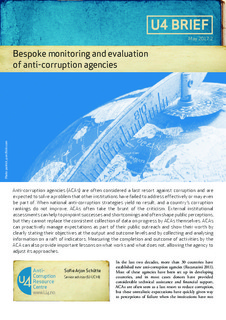Bespoke monitoring and evaluation of anti-corruption agencies
Report
Permanent lenke
http://hdl.handle.net/11250/2475381Utgivelsesdato
2017-05-01Metadata
Vis full innførselSamlinger
- Publications [1488]
Originalversjon
Bergen: Chr. Michelsen Institute (U4 Brief 2017:2) 6 pSammendrag
Anti-corruption agencies (ACAs) are often considered a last resort against corruption and are expected to solve a problem that other institutions have failed to address effectively or may even be part of. When national anti-corruption strategies yield no result, and a country's corruption rankings do not improve, ACAs often take the brunt of the criticism. External institutional assessments can help to pinpoint successes and shortcomings and often shape public perceptions, but they cannot replace the consistent collection of data on progress by ACAs themselves. ACAs can proactively manage expectations as part of their public outreach and show their worth by clearly stating their objectives at the output and outcome levels and by collecting and analysing information on a raft of indicators. Measuring the completion and outcome of activities by the ACA can also provide important lessons on what works and what does not, allowing the agency to adjust its approaches.
